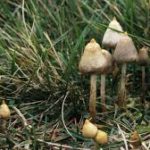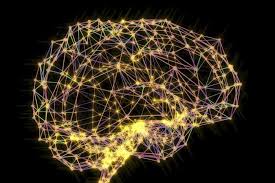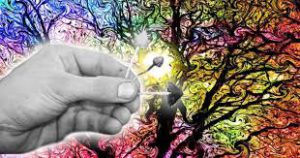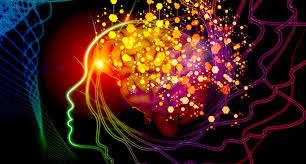The news has been so depressing lately, it seems like a good time to post something positive. So here’s a look at some new research suggesting amazing benefits from psychedelics like psilocybin — especially for people who need help overcoming anxiety. The main question is: how do these drugs work and what new directions do they suggest for replacing loneliness with connectedness as our biology, culture, and technology continue to evolve in sync?
But first, a few laughs about how bad things have been, thanks to John Oliver.
The new research was conducted at Johns Hopkins University and New York University (NYU) and published December 1 in The Journal of Psychopharmacology. Here’s a nice overview. In this post I want to consider the brain changes produced by psilocybin (very similar to those caused by other psychedelics, including LSD and ayahuasca).
 The participants in the study were cancer patients (understandably) experiencing lots of anxiety and depression about their illness. To quote from the Scientific American article, “more than three-quarters [of these patients] reported significant relief from depression and anxiety—improvements that remained during a follow-up survey” six months later, after taking a single dose of psilocybin (magic mushrooms) in a controlled setting. These long-term effects are exciting: lasting changes in people’s feelings and behaviour, which of course suggest enduring brain changes. I think these changes put a positive spin on how humans think about drugs, which is a refreshing change from all the negativity.
The participants in the study were cancer patients (understandably) experiencing lots of anxiety and depression about their illness. To quote from the Scientific American article, “more than three-quarters [of these patients] reported significant relief from depression and anxiety—improvements that remained during a follow-up survey” six months later, after taking a single dose of psilocybin (magic mushrooms) in a controlled setting. These long-term effects are exciting: lasting changes in people’s feelings and behaviour, which of course suggest enduring brain changes. I think these changes put a positive spin on how humans think about drugs, which is a refreshing change from all the negativity.
As my readers probably know, I have long divided drugs into good, bad, and somewhere in the middle. Heroin, crack, and meth…bad! In the middle we’ve got cannabis, maybe ecstasy, alcohol (for some but NOT others), and mild mood-helpers such as kratom. The good drugs — the psychedelics — aren’t good for everybody. There is always that minority who have bad  trips, scary psychotic detours that may last hours or even weeks. But for most people, at least those willing to let go of their day-to-day constructions of reality (for a while), I think psychedelics can be a real boon. They can take us on a journey that reveals a universe we may not have known existed. Kinda like the explorers of the 1400s and 1500s who sailed past the horizon and discovered that the world was round, not flat. (If interested, see my piece on LSD and the brain in The Guardian, and a review in Scientific American.)
trips, scary psychotic detours that may last hours or even weeks. But for most people, at least those willing to let go of their day-to-day constructions of reality (for a while), I think psychedelics can be a real boon. They can take us on a journey that reveals a universe we may not have known existed. Kinda like the explorers of the 1400s and 1500s who sailed past the horizon and discovered that the world was round, not flat. (If interested, see my piece on LSD and the brain in The Guardian, and a review in Scientific American.)
To quote from Scientific American, lead author Roland Griffiths says that psychedelics show “remarkable potential for treating conditions ranging from drug and alcohol dependence to depression and post-traumatic stress disorder….They may also help relieve one of humanity’s cruelest agonies: the angst that stems from facing the inevitability of death.” Griffiths’ interest in psychedelic research arose partly from his interest in mindfulness meditation, and he’s actually studied meditators who have taken psychedelics to enhance their “spiritual” practice. So when we look at the brain changes triggered by psilocybin and LSD, the most interesting finding is that psychedelics and meditation both reduce activation in something called the default mode network (DMN).
 The brain is divided into several functional networks, each responsible for a different kind of engagement with the world. A network connecting prefrontal (and other regions) is in charge of problem solving, something we do a lot. A network anchored in the parietal cortex (that big middle part) is responsible for shifting attention to incoming stimuli, events that are potentially important in the here-and-now. But the default mode network is a set of cross-linked regions that extend from the middle of the frontal lobes (social cognition) to the hippocampus, which keeps track of the details of memory, to parts of the cingulate cortex involved in compacting memories into a gist-like overview, to areas in the posterior cortex that underlie our perception of other people’s motives and feelings.
The brain is divided into several functional networks, each responsible for a different kind of engagement with the world. A network connecting prefrontal (and other regions) is in charge of problem solving, something we do a lot. A network anchored in the parietal cortex (that big middle part) is responsible for shifting attention to incoming stimuli, events that are potentially important in the here-and-now. But the default mode network is a set of cross-linked regions that extend from the middle of the frontal lobes (social cognition) to the hippocampus, which keeps track of the details of memory, to parts of the cingulate cortex involved in compacting memories into a gist-like overview, to areas in the posterior cortex that underlie our perception of other people’s motives and feelings.
As the name suggests, the default mode network is “on” a lot of the time. In fact it’s where we go, so to speak, when we’re not doing much else — when we’re daydreaming, reminiscing, imagining, rehearsing tidbits of future actions and possible conversations. But what does this network actually do?
To experience what it does directly, just try to meditate or still your mind for a few minutes. All those wandering thoughts, snatches of conversation, all the what-if images…maybe if I said this, she’d say that…I should really get on with updating my  CV…I wonder what’s for dinner tonight…am I supposed to cook, or is it Isabel’s turn? The DMN network is what manufactures all those wandering thoughts and fantasies. (And note that more advanced meditators show less activation of the DMN.) So the purpose of the network seems to be to propagate the sense of a coherent self, an ego, a me. And the problem with that is that ALL of our worries, negative thoughts, concerns about how meaningless it all is, concerns about whether I’m going to get sick, die, be lonely, or get high, relapse, and how long that might go on…all that fussing is simply a cascade of revisions of how best to care for oneself, protecting, optimizing, enhancing…ME!
CV…I wonder what’s for dinner tonight…am I supposed to cook, or is it Isabel’s turn? The DMN network is what manufactures all those wandering thoughts and fantasies. (And note that more advanced meditators show less activation of the DMN.) So the purpose of the network seems to be to propagate the sense of a coherent self, an ego, a me. And the problem with that is that ALL of our worries, negative thoughts, concerns about how meaningless it all is, concerns about whether I’m going to get sick, die, be lonely, or get high, relapse, and how long that might go on…all that fussing is simply a cascade of revisions of how best to care for oneself, protecting, optimizing, enhancing…ME!
That self-involvement isn’t wrong, and obviously it has adaptive value. But it’s also precisely the condition for anxiety — the state of being uncertain about what will happen to ME. So muting the default mode network might be a very good thing, at least on occasion, leaving us less self-involved, less concerned about what might happen, and less motivated to make things “better” by, oh, you know, taking stuff.
 Psychedelics release us from a preoccupation with ourselves by reducing DMN activation. They allow us to be more open, more connected with other people, with our planet, with our universe. Psychedelics can usher us through a Copernican shift from viewing ourselves as the centre of the universe to viewing ourselves as interested participants in something much larger and possibly much more interesting.
Psychedelics release us from a preoccupation with ourselves by reducing DMN activation. They allow us to be more open, more connected with other people, with our planet, with our universe. Psychedelics can usher us through a Copernican shift from viewing ourselves as the centre of the universe to viewing ourselves as interested participants in something much larger and possibly much more interesting.
I have little doubt that, within a couple of hundred years, genetic engineering will advance to allow us to modify our biological makeup, that is if we survive that long. Maybe psychedelic exploration and mindfulness meditation will help point the way toward changes that serve as improvements. Maybe the DMN could be turned down, or even turned off, through a bit of neural restructuring, to reduce our concerns for self-optimization and make more room for the rest of the world. Less anxiety, less greed, less power-mongering…more love.
Sound cheesy? What can I say? I’m a child of the sixties.

Leave a Reply